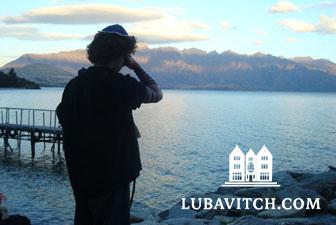(lubavitch.com) A kosher restaurant in the Christchurch, NZ?
You bet, says Chabad’s Rabbi Mendy Goldstein of New Zealand. For Israeli backpackers who tromp the country’s pristine South Island each year, the new restaurant will be a boon.
“It pains us to see people eating non-kosher because they have no other choice,” said Sara Goldstein, co-director of the kiwi Chabad.
20,000 tour the regional capital of Canterbury annually, and New Zealand is home to some 10,000 Jews, so Chabad's decision to open the first kosher restaurant there by the end of 2008, is important. Still in the architectural drawing stages, the eatery on the first floor of the Chabad center’s rented building in the city’s center will be the first kosher food available to locals. Currently, the only nod to kosher food in the area exists within the pages of the “Kosher Kiwi Directory,” a list of kosher grocery items.
Rabbi Goldstein, the center’s other co-director, views the restaurant as a first step in building a future for New Zealand where “Jewish living is convenient and enjoyable” for travelers and especially for its general Jewish population.
Since their arrival from Brooklyn, NY, a year ago, the Goldsteins, based in Wellington, have been steadily working toward their goal, with partial funding by the Rohr Family Foundation.
Jewish education is another priority that the Goldsteins have marked “urgent” in their business plan. Mrs. Goldstein’s preschool attracts 20 to 30 moms and their tots each week. Rabbi Goldstein has prepared several preteens for their bar and bat mitzvahs.
Canterbury Hebrew Congregation, Christchurch’s only synagogue, designated Rabbi Goldstein as ‘shaliach,’ a title generally endowed to itinerant rabbis visiting form Israel, and now he leads the Hebrew school and community events. The congregation’s board and Rabbi Goldstein are discussing plans to build a mikvah on synagogue premises, because the closest mikvah is either a chilly ocean dip or an hour-long flight to Wellington.
But it is holiday celebrations that bring in the greatest numbers to Chabad. Recently, some 500 joined Chabad hosted Passover Seders in Christchurch, Dunedin, Nelson and Queenstown.
Spending the Passover Seder with Chabad touched Michael Delamore of Christchurch. His family “felt moved by the story of freedom from so long ago and in how it applies in their own spiritual lives today. The children were interested in everything, except the maror,” bitter herbs.
Rabbis in training Avrohom Rimler and Yaakov Glasner flew in from their rabbinical college in Sydney, Australia to lead Dunedin’s Seder. After a round of adventures searching for a kitchen to kosher for the Seder preparations and securing provisions and two successful Seders that had Israeli backpackers singing holiday songs past midnight, the two young men set out to see what they could do to help Dunedin’s 40 Jewish residents.
“It’s telling that everyone [Rimler and Glasner] tried to contact opened doors to them. I haven’t heard a single negative comment. People felt having them in town was a great blessing,” said David Brisman.
Seventeen Jewish homes in Dunedin are graced with mezuzahs now, and twenty-two women and girls accepted Shabbat candle lighting sets from the visiting rabbis. Not wanting to leave without reaching every Jewish person in a place that bills itself as the “World’s Southernmost Jewish Community,” the pair scoured Dunedin’s Jewish cemetery for names.
Sun bleached tombstones in the cemetery bore inscriptions dating back to the 1840s. In 1860, a gold rush in the area swelled Dunedin’s Jewish population to 275. Waves of anti-Jewish violence in Europe brought more Jewish immigrants, mostly to Wellington and Auckland, in the north island.
Bisman, a sixth generation New Zealander, recalls his grandmother speaking of the scandal raised in the early 1900s by European widows who donned prayer shawls in the synagogue to recite the Kaddish memorial prayer for their husbands, all pogrom victims. A particular point of pride for the Jewish community dates back to 1873, when Julius Vogel, a practicing Jew originally from England became prime minister.
List of tombstone names in hand Rimler and Glasner combed through the phonebook to contact the early settlers’ descendants. “Everyone we called was not Jewish anymore. Over the generations, the children of the early settlers either moved away or assimilated,” said Rimler.
Today, Dunedin has a community synagogue, but very little in the way of Jewish education. A group of children attending a Passover event hosted by Chabad saw their first Torah scroll. Before Glasner and Rimler headed back to Sydney, they and Rabbi Goldstein laid the groundwork for a Jewish university student to teach Hebrew school to Jewish children living in the area.
Bisman acquired a pair of tefillin from the young men. “As I have grown older and matured, I have been wanting to add more layers of observance to my Jewish life. Tefillin is a mitzvah that I’ve wanted to practice for some years now, and they gave me the opportunity. I feel privileged to be able to put them on each day. It is making my life better, and I feel more Jewish.”

Be the first to write a comment.